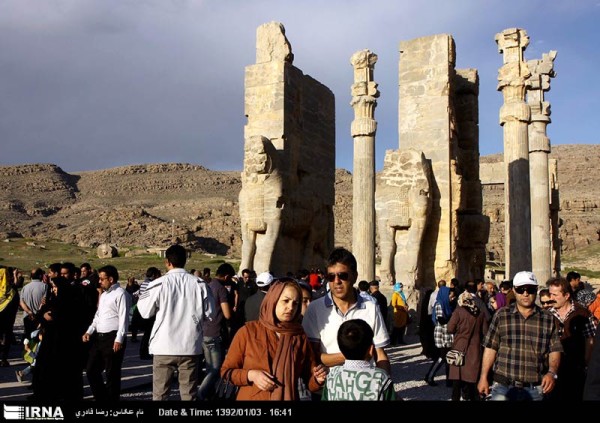by John Limbert
Henry Kissinger may be the grand old man of US foreign policy, but when it comes to understanding Iran, his analytical skills have begun to fade. In his NPR discussion with Scott Simon, broadcast Sept. 6, Kissinger got it monumentally wrong. One can only be grateful he is no longer making policy.
What is it about being national security adviser that leads to ill-advised “belt” metaphors? In the late 1970s, President Carter’s adviser Zbigniew Brzezinski famously (and incorrectly) spoke of a geographic “green belt” of Islam that would defend the Middle East against Soviet aggression. It turned out that, if such a belt existed, its inhabitants in Iran and Afghanistan—no matter how much they disliked the Soviets—inflicted serious damage on the United States. In the Iranian case, they toppled one American president (Carter) and nearly brought down another (Reagan).
Now Kissinger is talking not only of belts, but also of Persian empires. He told NPR that Iran is a “bigger problem” for the US than the vicious Islamic State, which is commonly referred to as ISIS. “There has come into being a kind of a Shia-belt from Tehran through Baghdad to Beirut,” said Kissinger. “And this gives Iran the opportunity to reconstruct the ancient Persian Empire, this time under a Shia label.”
Nonsense. As a scholar of history and a Harvard PhD, Kissinger should know better. He once said that the United States had more common interests with the Islamic Republic than with many of its friends. That view is much more sensible than beating drums about some imaginary threat of a new Persian empire and a Shia belt.
No one has been so misinformed about Iran since Mitt Romney, during his 2012 presidential campaign, told us that “Iran needs its alliance with Syria to secure access to the sea.” Perhaps Harvard, where both these men studied, has some basic problem teaching Iran’s history and geography. It appears that Romney never realized Iran already has over 1,000 miles of coastline on the Persian Gulf and the Sea of Oman. As for Kissinger, he apparently never learned that there has been no “Persian Empire” ruling beyond the Iranian plateau for over thirteen centuries.
Persia in the ancient world was indeed a world empire and a threat to its neighbors. Its forces burned Athens (in the 5th century BCE), defeated Roman armies numerous times, and captured Jerusalem and attacked the walls of Constantinople (in the 7th century CE).
All that Persian rampaging was a very long time ago, although ruins from those days of glory still cover modern-day Iran. Iran today, whatever its pretensions, is far from reconstructing some ancient and mighty empire or weaving a belt out of Shia Muslims in Iraq and Lebanon. Thanks to the Shia religion, the Persian language, and some very inept foreign policy, the Islamic Republic today stands isolated in its region surrounded by peoples who share neither its language nor its sect of Islam. Rather than leading a new Persian empire that will once again storm the Acropolis, the Iranians today are more like the medieval Bretons: they speak a language no one understands and venerate saints no one has ever heard of. When Tehran attempted to use Shia Islam against Saddam’s Iraq during the bloody 1980-88 war, its efforts were an utter failure, and Iraq’s Shia Arab soldiers fought loyally for their country.
The Islamic Republic may be an unattractive regime that mistreats its people, declares war on its own intelligentsia, imprisons journalists, and creates gratuitous enemies among its neighbors instead of following its obvious national interests. If we speak of belts, however, we should speak of belts of Sunnis, Arabs, and Turkic peoples who keep Iran isolated in its region. That the fractious bumblers who run the Islamic Republic could ever revive a Persian Empire (based on Shia Islam or anything else) that disappeared over 1,300 years ago is nothing short of absurd.
— John Limbert, a retired Foreign Service Officer and scholar of Iran, is Professor of Middle Eastern Studies at the US Naval Academy. He also earned his PhD in history and Middle Eastern Studies at Harvard.


Henry Kissinger should give us a wink or two when he utters nonsense about Iran’ building a new Persian Empire.
That said, Iran will cause a great deal of trouble if it fails to make a deal with P5+1 and instead further expands its nuclear programme.
Maybe the problem is not that there is no belt, but that there are too many belts criss crossing.
On another note, the last important persian empire ended a little more than 250 years ago, not 13 centuries ago, with the end of the Safavid empire, which at its greatest extent covered the territory of 16 current countries.
excuse me john but what is really ABSURD is your ridiculing kissingers statement that a kind of shia belt stretching from tehran to beirut gives iran the opportunity to reconstruct the ANCIENT persian empire as it existed OVER 13 CENTURIES AGO just because that was SUCH A LONG TIME AGO hahahaha not to mention your gratuitous snark that this supposed lapse shows he is too senile to be taken seriously about anything
I like John Limbert very much, He is so nice and Iranian. I’m agree with John, Iran has nothing to reconstruct a mighty empire like that one it had in ancient times.
Persian language is spoken in Tajikistan, Afghanistan, Western Pakistan and other parts of “greater” Iran – the author may want to educate himself a bit more on that aspect of his Persian knowledge!